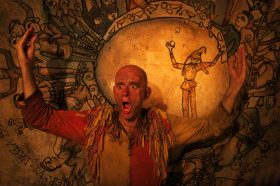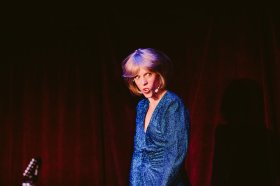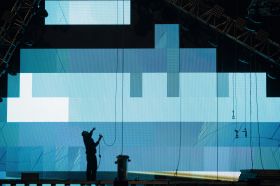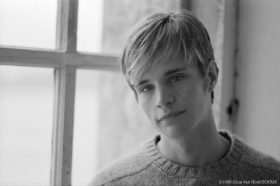Amid the polarity of debate about Australia’s refugee policy, too rarely do we hear the voices of refugees themselves.
In Article 14.1, artist Phuong Ngo gives voice to those who flee persecution, focussing on the experience of Vietnamese refugees seeking asylum in Australia, following the fall of Saigon. The title refers to Article 14.1 of the Universal Declaration of Human Rights, which states: ‘Everyone has the right to seek and to enjoy in other countries asylum from persecution.’
The artist’s own history is deeply rooted in the refugee experience, and he pays respect to this heritage by occupying the gallery for the ten-day duration of the exhibition, while subsisting on the same meagre supplies his family survived on in their journey.
The artist, seated at a small table at the front of the gallery, quietly folds small origami boats from ‘Hell Bank Notes’, a form of paper currency that is traditionally burnt as an offering to the dead. The audience are invited to remove their shoes and sit at one of eight red tables.
On each table a short video loops on a tablet, demonstrating the art of making the paper boats. Visitors are invited to fold their own boats while listening to recordings of refugees’ intensely personal stories of their journey to a new life in Australia. The origami boats will be burnt at a ceremony on May 11; the stories are moving and intimate.
In one, we hear of a refugee, then 17 years old, who tried on twenty separate occasions to escape by boat. Only three times did he actually board, with his money usually stolen by scammers who then notified authorities of his attempt to flee, resulting in him being jailed. In another, we hear of a parent’s sleepless nights before deciding to make a dangerous journey with a five-year-old child.
Sadly, we also hear the untold stories of those that didn’t make the journey.
This performance seamlessly melds recorded narrative and performance into a compelling exploration of the refugee experience.
The act of folding the small, paper boats creates a deep sense of communion with refugees’ stories as they are told. The artist has cleverly engaged the audience in this meditative act, busying the hands while the mind is focussed solely on these compelling tales of hope and loss. Much like how sharing a meal can allow difficult conversation to flow, involving the audience in this simple, shared act breaks down the barriers between the subject, the artwork and the viewer. Paradoxically, the mind is distracted so that the story may be heard.
The design of the performance space also plays its role, with the red tables, stools and rugs channelling the warmth of community and family, universal themes in the refugee story.
Phuong Ngo has created a vital reminder that such rights do not apply to particular groups, countries or peoples as a whole, but to mothers, fathers, sisters and brothers, who each have their own important story to tell.
Rating: 4 ½ out of 5 stars
By Phuong Ngo
No Vacancy Gallery, Jane Bell Lane, Melbourne.
Next Wave Festival
www.nextwave.org.au
1 – 11 May





